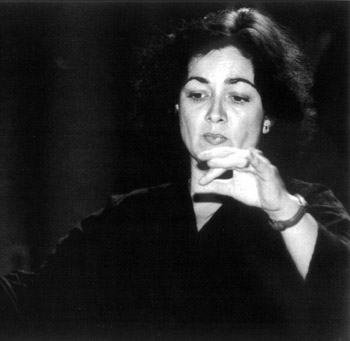![[Metroactive Music]](/music/gifs/music468.gif)
[ Music Index | Silicon Valley | Metroactive Home | Archives ]
Prodigy Power
Symphony bids farewell to the Center for the Performing Arts with sensational young soloist
By Scott MacClelland
APPEARING with Symphony Silicon Valley last Saturday, slender, blonde, 17-year-old Natasha Paremski stunned the audience with a sensational performance of the all-but-unknown Piano Concerto in D Minor by Anton Rubinstein. As her interpretation of the once-famous romantic thriller unfolded, several things became clear: her technique is finished and fearless, her concept of the music is mature beyond her years and her artistic instincts are passionate. About the only thing she lacks at the moment is the muscle needed to plumb the deepest sonorities of the symphony's Steinway.
At age 8, Paremski's family emigrated from their native Moscow to the United States, and she continued her piano studies at the San Francisco Conservatory. Last winter, she made her Carnegie Hall debut with Rachmaninoff's Second Piano Concerto. Though less than an enduring masterpiece, the Rubinstein concerto (1864) balances tuneful themes with plenty of Lisztian keyboard bravura. But it would be the filigree toss-offs and sensitive lyricism, especially in the slow movement, that best demonstrated Paremski's remarkable talent.
Her body bobbing and rocking to the muse, she came to a perfect reconciliation of the composer's expressive style and her own response to it. Her phrasing and dynamic control made an unforgettable impression. Not since the late Raymond Lewenthal took up the work in the 1970s has such a memorable revival been made. As the audience loved Paremski, she loved them back, lighting up her curtain calls with a beaming smile, confidence and poise. At last, she encored with Rachmaninoff's blustering Prelude in B-flat in bold, lyrical and individual style.
As the last guest conductor of the symphony before its relocation next season to the renovated California Theater—with less than half the seating capacity of the Center for the Performing Arts but with plans to play two performances there of each program—Sebrina Maria Alfonso made a flamboyant but fairly unimpactful impression from the podium. Her big gestures seemed and sounded superficial.
But then, she was working under tough conditions. The conductor of the Key West Symphony had a less-than-first-rate San Jose orchestra at her disposal. After two seasons without a music director, Symphony Silicon Valley is running more on gut than on discipline. The estimable strings are doing the heavy lifting. In Beethoven's Seventh Symphony, the winds came through most of the time in good shape, but the brass (horns and trumpets) cracked too many notes to go unnoticed.
To be taken seriously artistically, this band needs to clean up its act. Moreover, Alfonso did little to finesse dynamics, favoring loud and louder, encouraging the brass and percussion to the point of overriding the violins. (She was not the first guest conductor this season to indulge the same poor judgment.) Alfonso's program opened with Kodaly's early Summer Evening (1906,) a mood piece that develops two themes, a pastorale on cor anglais, and a Hungarian folk-influenced melody. Wisely, the young and at the time Debussy-influenced composer followed classical sonata form, but the impressionistic performance smoothed over that detail. Like the Rubinstein, this work was getting its local premiere.
[ Silicon Valley | Metroactive Home | Archives ]
Copyright © Metro Publishing Inc. Metroactive is affiliated with the Boulevards Network.
For more information about the San Jose/Silicon Valley area, visit sanjose.com.
![]()

Guest Stick: Sebrina Maria Alfonso led the Symphony Silicon Valley for its last performance at the CPA.
Send a letter to the editor about this story to letters@metronews.com.
From the date-date issue of Metro, Silicon Valley's Weekly Newspaper.